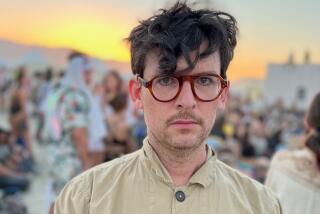A Close-Up Look at People Who Matter : Passing Along the Word to Save Yiddish
- Share via
Archie Barkan seems an unlikely guardian of history. A stand-up comedian who has emceed in the Borscht Belt of New York’s Catskill Mountains and the resorts of the Poconos and Miami Beach, he peppers his jokes with Yiddish.
But to Barkan, the future of Yiddish is no joke. He wants to preserve what many call a dying language.
Yiddish developed a thousand years ago as a form of medieval High German using the Hebrew alphabet. The Ashkenazi Jews who settled in Central and Northern Europe after the Diaspora added the languages of their new countries and Yiddish became a mix of German, Hebrew, Russian, English and Polish.
“Yiddish has a certain charm to it that has to do with it being a wandering language. It had no base,” said the 64-year-old Barkan, who seems almost too gentle, too soft-spoken for his profession as a comedian.
What some consider to be the death knell for Yiddish came when Hebrew was chosen as the official language of Israel. Today, many young Jews worldwide who study a second language choose Hebrew.
“Yiddish is on the decline for exactly that reason,” he said. “Generally speaking, the young people don’t learn the language enough to read a book.”
The numbers speak volumes: In 1990, 213,064 people in the United States spoke Yiddish, down from 315,953 only a decade before, according to the U.S. Census Bureau. In 1990, Los Angeles County reported 6,716 Yiddish speakers, a mere 0.02% of the population. In the San Fernando Valley, 3,013 residents speak Yiddish.
For Barkan, Yiddish is the language of his father, of his childhood.
“My father was a Yiddish writer and educator,” he said. “Even though I was born in Philadelphia, I knew Yiddish as a first language.”
In comedy acts and classrooms, Barkan is making sure the language isn’t relegated to the pages of history books and encyclopedias.
“This is mostly a labor of love,” he said. “Whatever is done to keep the language alive, I think is worthwhile.”
Barkan began teaching Yiddish in the 1970s out of a respect for the mame-loshen, the mother language.
“To me it has a real homey sound. The expressions are unique in that there’s more folksiness in the language than any other that I know of--a sort of wry humor in the expressionism,” he said. “That sort of ‘laughing with tears in my eyes’ approach.”
His students share the sentiment.
“It’s an old language that has much history,” said Gert Appleby, 71, of Encino during a break in Barkan’s class at Valley Beth Shalom in Encino. “I was born in Poland and Yiddish was the language spoken at home. I just don’t get a chance that often to use it. For me it’s important to continue.”
One of the problems the language faces is that at the same time younger Jews are learning Hebrew, speakers of Yiddish are dying off, Barkan said.
“Yiddish fell by the wayside and the people who used it died out,” Barkan said.
One woman in Barkan’s class speaks Hebrew but is learning Yiddish out of a sort of nostalgia and respect. It was the language her parents spoke.
“It’s sad because nobody speaks it anymore,” said Marcia Plager, 54, of Encino. “In 50 years, no one will speak it.”
They will if Archie Barkan can help it.
“I feel that it’s important to carry on the heritage. I think everyone has to remember where they are from,” he said. “The importance is the Jewish Ashkenazim life was steeped in Yiddish all these years. The immigrant experience in America was all Yiddish.
“There are those who say, ‘Why do we need two languages?’ ” he said. “It’s heritage. It’s roots.”
But Barkan too has faced obstacles and losses. Until a few years ago, Barkan said, he used to correspond in Yiddish with an uncle who lived in Israel. But that uncle died.
“Now I don’t think I have anyone to write to in Yiddish anymore,” he said.
Personal Best is a weekly profile of an ordinary person who does extraordinary things. Please address prospective candidates to Personal Best, Los Angeles Times, 20000 Prairie St., Chatsworth, 91311. Or fax them to (818-772-3338).
More to Read
Sign up for Essential California
The most important California stories and recommendations in your inbox every morning.
You may occasionally receive promotional content from the Los Angeles Times.













